This newsletter is also available as a PDF
IN FOCUS: Transparency and management of natural resources revenues
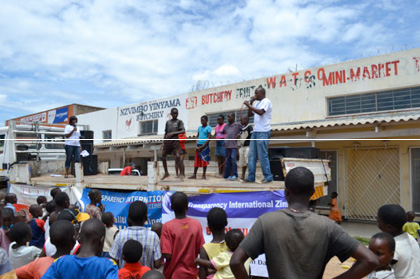
The “Electricity for all: ZESA give us light” road show at a Harare shopping centre in February 2012 drew more than 400 people. © Transparency International Zimbabwe
Transparency legislation in extractive industries under fire
Judith Poultney, Global Witness
Lobbyists are attempting to water-down transparency legislation in the European Union and the United States, which will require extractive industry companies to publish payments made to foreign governments for each “project” they operate. Both pieces of legislation, Section 1504 of the Dodd Frank Act and the EU Accounting Directive, are under intense attack in both the United States and across Europe.
One of the key debates is as to how a “project” should be defined. If the definition is too specific, then extractive companies will be obliged to publish unnecessarily large volumes of information. If the definition is too broad, then the resulting information will not make it possible to reliably track funds into government accounts.
The essence of project-level reporting is that it brings financial disclosure closer to the communities where extraction takes place and enables citizens to better track the sources of revenue to a particular region within a country. That is why civil society has proposed a definition of “project” reflecting the legal basis on which the extractive industries are organised. Extractive companies around the world typically acquire rights to exploit natural resources within a defined geographical area of a country which is governed by a legal agreement such as a license, lease, production-sharing agreement or concession agreement. If “project” matches up with the legal agreement this will be less burdensome for companies than having to report on every single oil field or mine, since a concession area may be quite large and contain several operations.
The European Union and the United States transparency laws should ensure that companies are required to disclose their payments on a project-by-project basis. For citizens, governments and companies, the benefits will far outweigh the costs.
Civil society and the prospects of accountability in Africa
Uche Igwe, governance expert and member of UNCAC Coalition
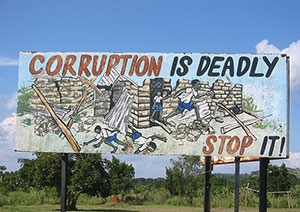
Anti-corruption sign in Uganda
© www.futureatlas.com
Since independence, Africa’s natural resource endowments have been managed in an unsatisfactory manner and today there is little or nothing to show, for example, for the vast sums of petrodollars that have supposedly accrued. Instead, political elites desperately compete to plunder these resources and dubiously convert them to private uses at huge opportunity costs to the population. This is very sad indeed!
According a 2010 McKinsey report on Africa, about 13% of global oil production is expected to take place in Africa. Furthermore, about 40% of gold, 80 – 90% global chromium and platinum reserves are currently held in Africa while the Democratic Republic of Congo controls half of the world’s cobalt reserves and a quarter of the diamond reserves.
It is a tragic paradox that poverty can exist side by side such a volume of riches. How long will Africa continue to be the poster child of hopes betrayed and tales of dubious political accountability.
Who shall African citizens rely on to mobilize collective grievances and demand the development that is needed so badly on the continent? When shall civil society groups (NGOs, community leaders, youth groups, etc.) insist on elite accountability especially in resource rich countries? That hope offered by hundreds of non-governmental organisations that coalesce around the Publish What You Pay Movement must be rekindled and amplified.
Information is necessary to generate knowledge and ammunition for advocacy. However, transparency alone is not sufficient. It must be converted to an enduring relationship of accountability that can translate to prosperity. African citizens themselves must realize that accountability is a relationship that must be demanded and exacted. It is time to pause and organise to reverse the trends of underdevelopment and unleash enduring change in Africa. African civil society, arise!
The interview
Four questions to Soji Apampa
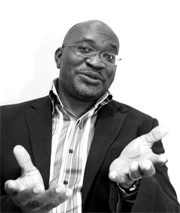
Soji Apampa is CEO of RTA Intelligence Ltd, a business research, intelligence and ethical due diligence company in Nigeria. He is a board member of the Convention on Business Integrity, Nigeria. He founded in Nigeria an NGO called Integrity and the Convention on Business Integrity, of which he is a board member. He also serves on the steering committee of the Business Action Against Corruption, a multi-stakeholder action by governments and private companies operating in 10 African countries. Ana Revuelta, consultant to Transparency International, put four questions to him.
-
An accomplished businessman, you have launched in Nigeria a number of anti-corruption initiatives. What are the incentives for the private sector to reject and fight corruption? Are these incentives enough to bring about real change?
In general the incentives include enhancing business reputation necessary for attracting the best talent, discerning investors and clients necessary for sustaining your competitive edge in the marketplace; reducing uncertainty and risks (profit projections mean nothing in environments where costs are uncertain and hidden items pop-up at anytime, where contracts mean nothing or cannot be enforced); increasingly it also means reducing the risk of criminal and civil sanctions and, with the UK Bribery Act, it means reducing personal risk of stiff fines and imprisonment – same goes for UNCAC and so on. Perhaps a huge incentive for people who invest other people’s money or their hard-earned income is the need to protect shareholders’ assets from being frittered away through corruption.
There are many incentives altogether, however on their own they are not sufficient to bring about real change. In fact, for many businesses operating in the grey zone, they are not sufficient to cause a re-think of their modus operandi. What is needed is a strong regulatory environment, strong stakeholder activism – such as from shareholder associations or civil society, but finally, public vigilance over the arrangement to keep all market players honest.
-
Today, can a small company in Nigeria survive and grow without resorting to corruption?
It is with extreme difficulty that a small or large company for that matter can survive and grow in Nigeria without resorting to corruption at some point or at some level, petty or grand, obvious or quiet. In order to survive the corrupt order, many see the need to band together as there is safety, learning, support and leverage to be found in numbers. The group itself must then systematically and proactively engage government and civil society in activities to reduce the barriers to business growth and compliance.
-
What can civil society do to approach and help the private sector towards a corruption-free business environment?
Civil society must be smart. It must be business-like in order to impress and subsequently win respect and space to be heard by business. Civil society must approach advocacy with evidence interpreted for business in terms of “whats-in-it-for-business” if the proposals are considered or ignored. This means civil society needs to be schooled in the art to developing the business case for policy options and making very logical, rational arguments for courses of action proposed. Business cannot pretend not to know the effects of corruption but very often need to be helped to find ways to remain profitable through alternatives to corruption – now that’s where civil society needs to be both creative and innovative. You may say why should we bother? In zones of weak governance where corruption is pervasive, we have found this approach to be successful in creating the room and space to show a better way exists for business. Impacts are possible as the bulk of corrupt acts are done in partnership with one business entity or the other.
-
We can’t mention your country without thinking of the oil business. Nigeria is one of the top world producers and exporters of oil, with revenues accounting for over 40% of GDP and 80% of government resources[1]. Do you see positive trends in the control of natural resources revenues in Nigeria? Who and what has to change?
Sadly, I do not see positive trends in the management of common pool resources such as oil and gas in Nigeria. The trends are worrisome as they could potentially destabilize a country that is widely believed to be on the mend if somewhat sluggishly. The process of “allocation” of oil blocs and concessions is opaque and serves private interests in the main. There is a lack of accountability of the National Oil Company to the country as it manages to spend receipts in ways unclear to forensic accountants asked to review its operations. The entire value chain of oil and gas upstream and downstream is locked into corrupt arrangements at every step and there is a need to communicate all the steps and processes to citizens in simple language, publish receipts and expenditures relating to oil in accessible language, and I am sure civil society will question the information and drill down to expose what is happening at every level. This very basic response could really spur many actors to ask the right questions and strengthen the demand for accountability from both businesses and government agencies involved in the sector.
Anti-corruption topics
The photo
To commemorate World Water Day on 22nd March: winner of the 2011 Photo Competition organised by the Water Integrity Network (WIN).
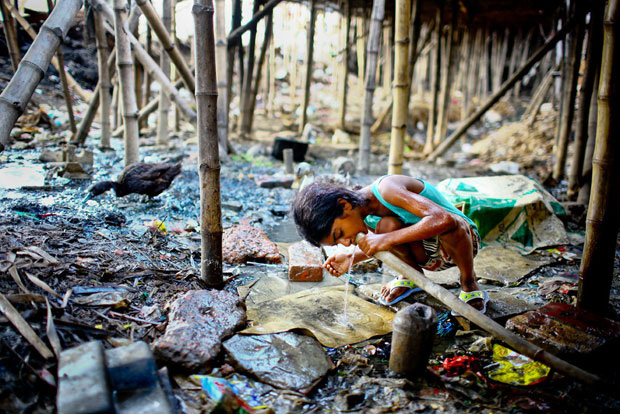
In Mirpur, slum dwellers have to wait hours and hours in the queue for water. Children drink water whenever they get the chance to get near a pipe. Slum dwellers of Mirpur hardly get drinkable water. Bad smell and impure wastage make the water high-risk. Dhaka, Bangladesh. © G.M.B. Akash
Stolen assets recovery: Alstom debarred by the World Bank for bribing Zambian officials
Maud Perdriel-Vaissière, Sherpa
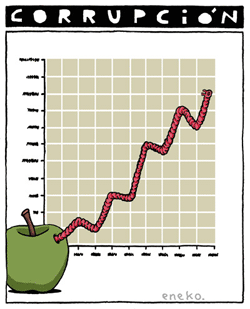
© Eneko / www.20minutos.es
The French company Alstom was fined €42 million in November 2011 in Switzerland in connection with a probe into bribery of foreign officials to win commercial contracts in three different countries. Now it is in the spotlight again, as the World Bank has debarred two Alstom subsidiaries on allegations of bribing a Zambian entity controlled by a former senior government official, in relation to a World Bank-financed project. Alstom Hydro France and Alstom Network Schweiz AG (Switzerland) have been banned from bidding on World Bank contracts for a period of three years and have committed themselves to pay US$9.5 million to the institution, as part of a negotiated resolution agreement with the World Bank’s Integrity Vice Presidency.
Sherpa welcomed the decision but has called for the damage caused to Zambia by this corrupt deal to be fully compensated. As a matter of fact, countries where bribes take place are barely compensated as part of settlement processes, while huge payments are made by companies to their home countries. Such a practice is not fair: the true victims of corruption are the people from the countries where corrupt deals have occurred.
Therefore, Sherpa expects the World Bank to replicate the negotiated resolution agreement concluded in 2010 with C. Lotti and Associati Societa’ di Ingegneria S.p.A. (Lotti) in the wake of the company’s acknowledged misconduct in a public works project funded by the Bank in the water sector in Indonesia. Lotti agreed to restitute an estimated US$350,000 to Indonesia. There is no reason for not including restitution payments in the case of Alstom in Zambia.
Sherpa further calls for the European Investment Bank (EIB) to join the 2010 cross-debarment agreement among the main multilateral development banks. Signed in 2010, it implies that debarred entities and individuals may be sanctioned for the same misconduct by the other signatories.
The twenty banks that were included in the report identified only 22 out of 29 client relationships with PEPs. Seven customer relationships were not identified as PEP, or were recognized but not treated as such. As a result of the investigations, FINMA launched an administrative procedure against four banks because of presumably severe breaches of regulations. However FINMA reveals neither the concrete customer relationships with PEPs that were examined and questioned, nor the names of the banks that failed in their obligations.
Another open question is why the banks did not report the suspicious funds earlier to the Money Laundering Reporting Office of Switzerland based on the existing Swiss Money Laundering Act (MLA). FINMA makes no proposals as to how to improve the law. The Swiss NGO Coalition sees a clear need for action, for example to shift the burden of proof for PEPs and to extend the MLA to real estate and commodity trading activities. In addition, the NGOs call for a stronger control of the banks by FINMA.
Protests against proposals to amend US foreign bribery law
Clark Gascoigne, Global Financial Integrity
A coalition of 33 American civil society and business groups, including human rights and anticorruption organizations, have called on the U.S. House of Representatives and Senate expressing their opposition to any efforts to amend the world’s flagship anticorruption legislation, the U.S. Foreign Corrupt Practices Act (FCPA).
The signatories –Amnesty International, Calvert Investments, Citizens for Responsibility and Ethics in Washington, EarthRights International, Global Financial Integrity, Global Witness, Human Rights Watch, Publish What You Pay United States, Revenue Watch Institute, Open Society Policy Center, Oxfam America, Revenue Watch Institute, Transparency International-USA, among others– are concerned that members of Congress in both the House and Senate are considering introducing legislation that would weaken the decades old law.
The organizations stated in their correspondence that any narrowing of the law, which serves as the model for other international anticorruption conventions and foreign anticorruption laws, would have a negative effect on global commerce, human rights, and the standing of the U.S. in the world. The full letter can be read here.
In other news, U.S. Secretary of State Hillary Clinton was the first Cabinet-level U.S. official to express the administration’s opposition to efforts to weaken the foreign bribery law. More available from The Wall Street Journal.
Advocacy by TI ahead of Rio+20
Alice Harrison, Transparency International
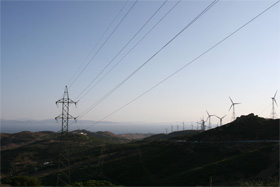
Wind generators in Spain © Ana Revuelta
Rio+20 has been twenty years coming. It takes place in three months time. Until then Transparency International (TI) will be lobbying government delegations to ensure that two critical issues are addressed in the conference’s outcome document: preventing corruption and addressing risks in climate finance. Both are currently absent from the text under negotiation.
In 1992 Rio de Janeiro hosted the biggest political gathering ever. Under the banner of sustainable development, the 1st UN Earth Summit marked the first time that world leaders treated the environment, society and economics as interrelated issues. Twenty years on, delegates gathered in Rio will be called upon to assess how far we have come in realising the objectives that were set back then. Rio+20 thus offers an unprecedented opportunity to set right the anti-corruption agenda. If it fails to do this, corruption will continue to undermine progress towards poverty alleviation and sustainable green economy growth.
At TI we are calling on governments and businesses to strengthen governance at local, national and global levels; enshrine mechanisms to promote democratic ownership, transparency and accountability; and ensure ethical conduct in both policy and practice.
All these issues are also critical for climate finance. When free from corruption, climate finance has the potential to play a major role in the financing of sustainable development. Given the potential volumes involved and the relatively untested nature of its institutional framework, climate finance must be treated as a ‘new and emerging challenge’, distinct from development aid. As of today, the possible Rio+20 outcome document is missing this link.
» Click for more information on TI’s Rio+20.
Using the UNCAC to promote good governance and transparency within the context of global tobacco control
Rose Nathan and Monique E. Muggli, Legal Advisors, International Legal Consortium at the Campaign for Tobacco-Free Kids

The World Health Organization Framework Convention on Tobacco Control (FCTC) entered into force on 27 February 27 2005. The treaty requires Parties (currently 174) to implement evidence-based measures aimed at reducing the devastating global health, social, environmental, and economic harms caused by tobacco use and exposure to tobacco smoke.
Because of the inherently deadly nature of tobacco products and the tobacco industry’s well-documented tactics of subverting effective tobacco control policies globally, FCTC Article 5.3 requires Parties to protect their public health policies related to tobacco control from the commercial and other vested interests of the tobacco industry.
The implementing guidelines to Article 5.3 recommend eight broad measures for protecting such policies, including: limiting government-tobacco industry interactions unless necessary for effective regulation of tobacco products or the tobacco industry; requiring transparency of necessary interactions; and avoiding conflicts of interests for public officials by banning political contributions and payments and gifts by the tobacco industry to public office holders, prohibiting tobacco industry representation on any government body or committee, and regulating the “revolving door” between the tobacco industry and governments.
In implementing FCTC Article 5.3 obligations, States that are also Parties to the United Nations Convention against Corruption (UNCAC) should use domestic measures implementing UNCAC to promote implementation and enforcement of applicable FCTC requirements. Therefore, coordination between civil society organizations involved with implementing these Conventions would be fruitful for the advancement of good governance and transparency.
For further information or to explore possibilities for in-country collaboration, please contact The International Legal Consortium at the Campaign for Tobacco-Free Kids.
Slow progress in the UNCAC review process
Gillian Dell, Transparency International
Slowly but steadily the review teams in the UNCAC review process are completing reports covering the countries in the first year – those under review since July 2010. Of the expected twenty-six first year reports, nine have been completed according to published information. UNODC advises that several more reports are in the pipeline and that one of the reasons for delay is the need for multiple translations along the way.
The full review reports are not accessible to the public unless the government decides to publish. Only Finland is known to have published theirs so far, while other governments are expected to do so soon. The review guidelines only call for publication of Executive Summaries, which to date have ranged in length from 7 – 12 pages. The summaries for Bulgaria and Indonesia were the latest to be posted on the UNODC website, in a document dated 16 January 2012, among documents for the upcoming Third Session of the Implementation Review Group (IRG) in June 2012. Other summaries can be found elsewhere on the UNODC website, eg. among information concerning the Second Session of the IRG that took place in May/June and September 2011 and the Fourth Conference of States Parties held in Marrakesh in October 2011. UNODC has advised that they will place all Executive Summaries in one single location on their website, together with any published self-assessments, but this transfer is taking time.
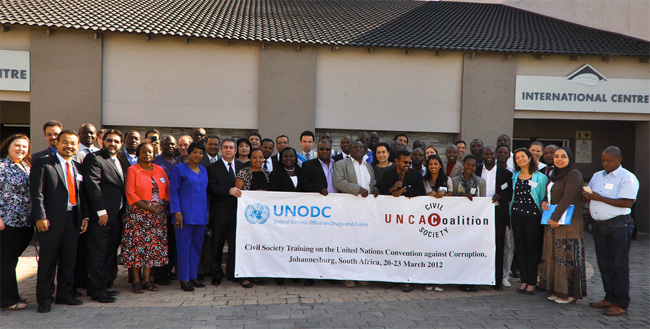
Participants to civil society training on the UNCAC in Johannesburg, 20–23 March 2012. © Andrea Figari
Meanwhile, in a number of second year countries, civil society organisations (CSOs) report that country visits by review teams are underway. Unfortunately, UNODC is not authorised to publish information about the country review schedules. The paradox is that a process intended to promote transparency and accountability remains opaque.
In June 2012, the IRG meeting in Vienna at its Third Session will assess the progress to date in the UNCAC review process and the resulting findings on UNCAC implementation. It will also hold its first-ever briefing for CSOs on 20 June. At the last UNCAC Conference of States Parties this briefing was agreed as a temporary substitute for CSO observer status in the IRG.
UNCAC Coalition at work
Joint civil society submission to the G20 Anti-Corruption Working Group
Angela McClellan, Transparency International

TI and Global Witness have coordinated another civil society submission to the G20 Anti-Corruption Working Group, which is now co-chaired by Mexico and the UK, in advance of their first meeting in 2012.
After a year long advocacy campaign, in 2010 the group of the most powerful states on the globe, the G20, surprised the anti-corruption movement by publishing a very ambitious and comprehensive Anti-Corruption Action Plan which is based on the United Nations Convention against Corruption (UNCAC). The G20 set themselves the target to lead by example by achieving individual and collective progress on these commitments by 2012. Civil society is closely watching them and contributing to advancing the agenda by providing regular policy recommendations
For this year the G20 have committed to work on public sector integrity, including anti-corruption measures in public procurement, principles for an effective framework for stolen asset recovery and a set of principles for visa denial to corrupt officials.
What have the G20 achieved so far? India has ratified the UNCAC – albeit more likely due to pressure from its citizens than from the G20 – leaving Germany, Japan and Saudi-Arabia as the only G20 members who have yet to do so. China has new legislation criminalising bribery of foreign public officials; India and Indonesia have similar draft legislation. Russia has joined the OECD Anti-Bribery Convention. However, as we all know, legislation has to be effectively enforced in order to make a difference.
UNCAC Coalition opposes UNESCO’s Equatorial Guinea Prize
The UNCAC Coalition has condemned the decision made on Friday, 9 March 2012 by the members of UNESCO’s Executive Board at its 189th session to adopt the Equatorial Guinea – UNESCO International Prize for Research and Science.
Despite opposition from civil society groups as well as some government representatives in the organisation’s Executive Board, the award was accepted on the condition of changing its original name UNESCO – Obiang Nguema Mbasogo to the UNESCO – Equatorial Guinea International Prize for Research in the Life Sciences. Far from solving the dispute or appeasing the public outcry, the origin of the funds used to finance the prize are still in question, mainly because of the dubious reputation of the government that is perceived to be amongst the most corrupt in the world and is also known for well-documented brutality and whose citizens live in poverty despite the country’s oil riches.
UNESCO’s reputation has been damaged through the endorsement of the prize, putting Equatorial Guinea’s President’s interest above the spirit and principles of the United Nations and UNESCO’s constitutional goals by providing positive publicity to his regime about which there are grave concerns on many counts.
Furthermore, the UNCAC Coalition has called upon the Executive Board to set up clear, transparent guidelines for the creation of awards by the UN and UN agencies, in order to guarantee that all awards and their funding sources are in full accord with UN essential values, international commitments and standards regarding the promotion of human rights, the Millennium Development Goals and the global fight against corruption.
See the letters from Sherpa supported by the UNCAC Coalition addressed to the French Ministry of Foreign and European Affairs and the Director-General of UNESCO, opposing the appointment of Teodoro Nguema Obiang Mangue as Deputy Permanent Delegate of Equatorial Guinea to UNESCO and the establishment of the UNESCO – Equatorial Guinea International Prize for Research in the Life Sciences.
Elections to the Coordination Committee
The UNCAC Coalition is holding elections on 18–24 April for 5 out of 12 seats of the Coordination Committee. The period of nomination began in February and concluded the 5 March.
ECOSOC membership
NGO Coalition members are encouraged to consider applying for consultative status with the United Nations Economic and Social Council (ECOSOC).
The benefits of consultative status include a facilitated registration process to the sessions of the UNCAC Conference of States Parties, or the possibility to submit publications independently.
The requirements consist of filling in a form and sending a report every 3 years. More information here.
Research, publications, events
- TI-UNODC civil society training in South Africa (20–23 March 2012)
The UNCAC Coalition and Transparency International joined forces with UNODC to provide their second joint training for CSOs on the UNCAC review process, this time in Johannesburg, South Africa. Nearly 40 CSO representatives participated from 28 countries, most of them from Africa. (Unfortunately, two Nigerian citizens could not obtain visas to attend and an Algerian trade union representative was unable to participate because he was unable to obtain a new passport.)
The 3½ day workshop included simulations of a country self-assessment and of a review team country visit. The South African law firm Webber Wentzel sent four lawyers to work with participants on how to determine their country’s compliance with UNCAC provisions. The programme went on to provide advice on how to prepare and conduct advocacy around a CSO parallel report, with presentations from experienced CSOs of countries evaluated in the first year. Participants then held small group discussions on developing an advocacy strategy for different stages of the UNCAC review process. The training also included a segment on outreach to the private sector for UNCAC-related work. The participants were well-prepared, asked outstanding questions and were fully engaged in the sessions. (See photo above)
- Vijay Anand of 5th Pillar spoke at TEDx Conference in Leeds (29 February) about success and developments of the Zero Rupee Note project.
- New set of videos on the UNCAC review process produced by TI and the UNODC, with excerpts from the civil society trainings organised in Laxenburg (Austria) in 2011:
- Session 1 provides an introduction to the UNCAC and the UN Office on Drugs and Crime (UNODC), the secretariat to the convention.
- Session 2 explains the aims of the UNCAC implementation review process and how civil society organisations (CSOs) can be involved.
- Session 3 presents CSO strategies to pressure governments to fully implement the convention’s requirements.
- Session 4 introduces key decisions to be evaluated by CSOs when undertaking a parallel review of UNCAC implementation.
- Session 5 shares tips and insights from experienced organisations on what to expect in the process of evaluation of countries.
- Session 6 presents voices from Sri Lanka, the UK, Zambia and Germany explaining why CSO involvement in the UNCAC review process is valuable.
- International Anticorruption Academy (IACA): “Practice Meets Science: Contemporary Anti-Corruption Dialogue”, published in February 2012, is a compilation of scholarly articles written by lecturers of the International Anticorruption Summer Academy 2011. The volume offers insight into the complexity of corruption and sustainable modes of implementing anti-corruption measures.
- OECD: 3 new reports from the Working Group on Bribery, on the application of the Convention of Combating Bribery of Foreign Public Officials in International Business Transactions and related instruments by Italy, Hungary and the UK.
- StAR initiative of the World Bank and UNODC: “Public Office, Private Interests: Accountability through Income and Asset Disclosure”. This first global study of financial disclosure laws and practices shows that disclosure of assets and income by public officials is crucial to deter the use of public office for private gain and to help manage actual and apparent conflicts of interest in the public sector.
- Counter-terrorism, ‘policy laundering’ and the FATF. A new report by the Financial Action Task Force (FATF) examines the global legal framework and the impact of FATF’s ‘Special Recommendation VIII’ on countering the threat of terrorism financing said to be posed by non-profit organisations. You can consult the full report and its executive summary.
- Access to public information in Spain: On 26 March 2012, Access Info Europe launched the web portal “Tu derecho a saber” (Your Right To Know) to guide and help citizens address information requests to any Spanish public institution. Spain is the only European country with a population over 1 million without Access to Public Information Legislation; a Bill is currently examined by Congress.
Upcoming dates
- 17–18 April 2012: Open Government Partnership’s Annual Meeting, Brasilia (Brazil)
- 15–23 June 2012: Peoples Summit for Social and Environmental Justice in defense of the commons, Rio de Janeiro (Brazil)
- 18–22 June 2012: UNCAC Implementation Review Group Meeting, Vienna (Austria)
- 7–10 November 2012: 15th IACC, Brasilia (Brazil)
About us
The UNCAC Coalition is a global network of over 310 civil society organisations in over 100 countries, committed to promoting the ratification, implementation and monitoring of the United Nations Convention against Corruption.
For this purpose, we mobilise civil society action at international, regional and national levels.
Comments? Submissions?
We’d love to hear what you have to say and to receive your contributions for the newsletter.
Credits
The UNCAC Coalition Newsletter is produced by the Anti-corruption Conventions team at the TI Secretariat, with consultants Ana Revuelta and Kai Chan.
An Editorial Committee supervises the publication, composed of: Gillian Dell, Andrea Figari, Saâd Filali Meknassi, Milton Ponson, Inés Selvood, Elina Zubaidy.
The UNCAC Coalition Newsletter is funded by the UN Democracy Fund (UNDEF).



